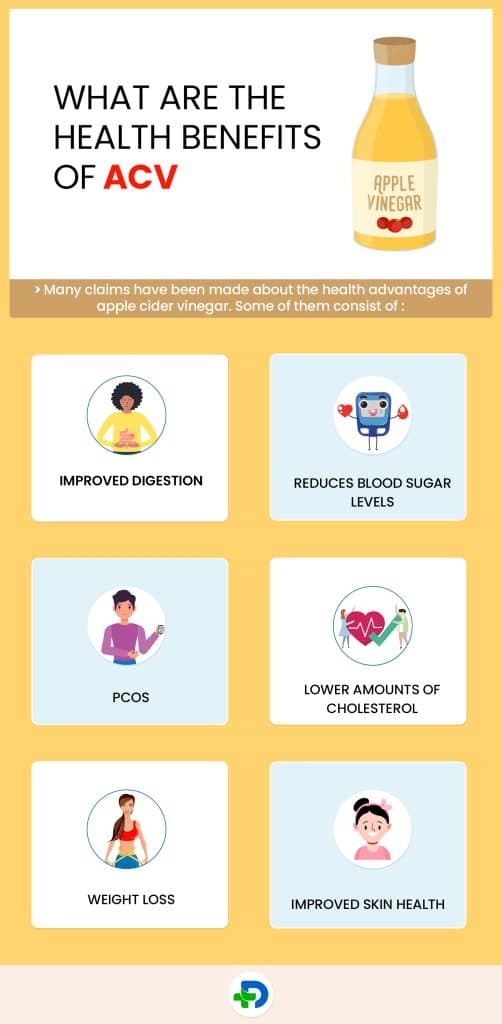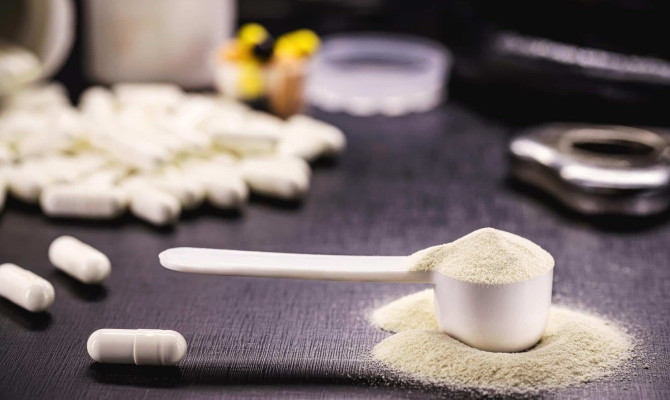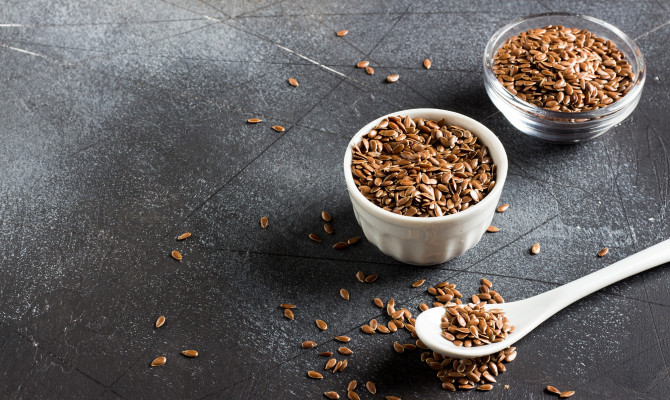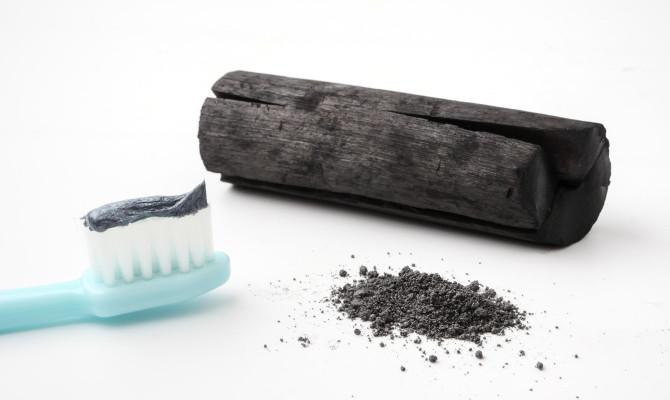Apple Cider Vinegar: Types, Benefits and Side Effects

- Apple Cider Vinegar
- 14 Aug 2023
Overview
The Apple Cider Vinegar
A kind of vinegar made from fermented apple cider is apple cider vinegar. The apples are pulverized, and yeast is added, causing the natural sugars in the fruit to ferment into alcohol. The alcohol is then mixed with microbes to create acetic acid, which gives vinegar its distinctive sour flavor and pungent odor.
Although it has some positive health effects, more research is necessary to comprehend how it affects the human body thoroughly.

Why is apple cider vinegar considered healthy?
It also includes acetic acid and other healthy substances like potassium, magnesium, calcium, polyphenols, and antioxidants.
The primary active component, acetic acid, is made when fermenting apples or apple juice. 1The Apple cider vinegar | Researched based study from Nlm.nih.gov
Types
Types of ACV
Raw, unfiltered
- This variety of vinegar includes the “mother,” a cloudy, sediment-like substance that naturally forms during fermentation and is made from organic apples. It is regarded as the best and most nutrient-dense variety.
Filtered
- This vinegar doesn’t have the “mother” because it is produced from filtered apple cider. Compared to raw, unfiltered apple cider vinegar, it has a clear look and a milder flavour.
Flavoured
- Some brands add herbs, spices, or fruits to improve flavour and offer extra health advantages. Examples include vinegar flavoured with turmeric and honey, ginger, cinnamon, and ginger.
Pasteurized
- This vinegar has been heated to prevent any dangerous bacteria from growing and extend its shelf life. However, some bacterial enzymes and nutrients present in fresh, unfiltered vinegar may be destroyed during the healing process. 1Types of ACV | Researched based study from Nlm.nih.gov
Health Benefits

What are the Health benefits of ACV?
Many claims have been made about the health advantages of apple cider vinegar. Some of them consist of:
Improved digestion
- By increasing stomach acid secretion and encouraging the development of good gut bacteria, apple cider vinegar may aid in bettering digestion. 7What are the health benefits of ACV | Researched based study from Nlm.nih.gov
Reduces blood sugar levels
- According to some research, it might lower blood sugar levels, which is good news for people with diabetes. This might be because it improves insulin sensitivity and slows the rate at which glucose reaches the bloodstream. 4What are the health benefits of ACV | Researched based study from Nlm.nih.gov
PCOS
- A hormonal condition called PCOS can cause insulin resistance, weight increase, and other health problems. Despite the lack of study, some studies point to the possibility of improving insulin sensitivity, which is a significant contributor to PCOS. 5What are the health benefits of ACV | Researched based study from Nlm.nih.gov
Lower amounts of cholesterol
- According to some animal studies, it might aid in lowering triglyceride levels. 4What are the health benefits of ACV | Researched based study from Nlm.nih.gov
Weight loss
- Increases feelings of fullness and decreases calorie intake to aid in weight reduction.
Improved skin health
- It might have antimicrobial qualities and be applied topically to address skin conditions like acne. 2What are the health benefits of ACV| Researched based study from Nlm.nih.gov
Other Uses
What other uses does apple cider vinegar have?
It has many other applications in addition to its health advantages. A few of these are:
- Rinse hair-It can be used as a natural hair rinse to aid in clearing build-up and re-establishing the skin’s pH balance. 7What the other uses does apple cider vinegar have| Researched based study from Nlm.nih.gov
- Killer of weed-When combined with water, it can also be used as a natural weed pesticide.
- Fruit and vegetable wash-A mixture of apple cider vinegar and water can wash fruits and vegetables to help remove pesticides and bacteria.
Application
How to use it?
It can be used in a variety of ways. Here are some standard methods:
As a food ingredient
- Apple cider vinegar can be used in cooking, baking, salads, etc. it can also be added to drinks like water or tea for a health boost.7Interaction of apple cider vinegar with food and medicines| Researched based study from Nlm.nih.gov
Topically
- It can be applied to the skin to help treat acne. It should be combined with water in an equivalent amount before being applied topically. 7Interaction of apple cider vinegar with food and medicines| Researched based study from Nlm.nih.gov
Supplement
- Supplements are also available in the form of pills or capsules for consumption. Talking to a doctor before taking supplements is essential, especially if you have a pre-existing medical condition or take medication regularly. 7Interaction of apple cider vinegar with food and medicines| Researched based study from Nlm.nih.gov
Dosage
Dosage of ACV
- The recommended dosage varies depending on the purpose of use.
- Combine it with water, tea, juice, or other liquids to make it more palatable. One tablespoon of vinegar to eight ounces of water is a typical amount. Before consuming, dilute because the high acidity of the food can irritate the throat and erode dental enamel.
- You can purchase it online or at most grocery shops in liquid form. Pick organic, unfiltered, unpasteurized vinegar to guarantee the most significant health benefits. 1Dosage of ACV | Researched based study from Nlm.nih.gov
Adverse effects
Adverse outcomes of ACV
Although its use could have advantages, there are also some possible dangers. Some of the risks are mentioned below.
Erosive tooth enamel
- Because it is so acidic, apple cider vinegar can erode dental enamel over time, causing sensitivity and cavities. 6Adverse outcomes of ACV | Researched based study from Nlm.nih.gov
Digestive issues
- Bloating, gas, and diarrhoea are common digestive problems for some people, mainly when they consume large amounts.
Low levels of potassium
- It might cause the body’s potassium levels to drop, which can be particularly risky for people who are already taking medications that do the same thing or those with kidney issues.7Adverse outcomes of ACV | Researched based study from Nlm.nih.gov
Skin irritation
- Applying undiluted apple cider vinegar can cause nausea and pain by delaying stomach emptying. 3Adverse outcomes of ACV | Researched based study from Nlm.nih.gov
Interactions
Interaction of apple cider vinegar with food and medicines
Antidiabetic drugs
- Taking it along with drugs like insulin or metformin may cause your blood sugar to decline too low because it may lower blood sugar levels. Before combining ACV with these medicines, talk to your doctor.
Antacids
- Because ACV is acidic, taking it with antacids that neutralise stomach acid may worsen the signs of acid reflux.
A few antibiotics
- It could interfere with some medicines, like ciprofloxacin and tetracycline, and lessen their potency. ACV should be avoided if you’re taking these.
Absorbing iron
- It may prevent iron from plant-based substances like leafy vegetables or beans from being absorbed. The wisest course of action is to avoid taking ACV with meals if you have an iron deficiency or depend on plant-based sources of iron. 7Interaction of apple cider vinegar with food and medicines| Researched based study from Nlm.nih.gov
Takeaway
Key takeaways
- Apple cider vinegar has potential health benefits due to its active constituents.
- It is crucial to remember that the dangers are primarily connected to excessive or frequent consumption. The key is moderation, and it’s best to speak with a medical expert before beginning any new health routine.
- People who have particular medical problems might need to restrict their intake. It does not substitute for a healthy diet and active lifestyle.
Any feedback on this article?
 This Articles content was accurate
This Articles content was accurate Very Informative Article
Very Informative Article I have a question or a comment
I have a question or a comment
 This article contains inaccurate content
This article contains inaccurate content This article was not helpful
This article was not helpful I have a question or a comment
I have a question or a comment
We appreciate your helpful feedback!
Checkout our social pages
References
-
National Library of Medicine
Vinegar: Medicinal Uses and Antiglycemic Effect | Overview | Uses
-
National Library of Medicine
The effect of apple cider vinegar on lipid profiles and glycemic parameters: a systematic review and meta-analysis of randomized clinical trials | Health benefits
-
National Library of Medicine
Safety and side effects of apple vinegar intake and its effect on metabolic parameters and body weight: a systematic review | Adverse effects
-
National Library of Medicine
Beneficial Effects of Apple Vinegar on Hyperglycemia and Hyperlipidemia in Hypercaloric-Fed Rats | Benefits
-
National Library of Medicine
Intake of vinegar beverage is associated with restoration of ovulatory function in women with polycystic ovary syndrome | Benefits
-
National Library of Medicine
[Unhealthy weight loss. Erosion by apple cider vinegar] | Adverse effects
-
National Library of Medicine
Vinegar: Medicinal Uses and Anti glycemic Effect | Adverse effects | Benefits | Interaction




































